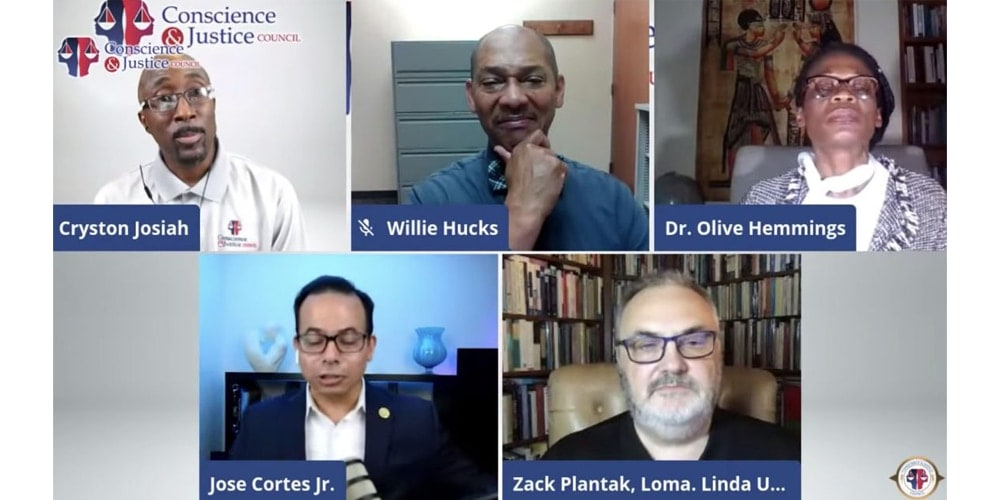
On September 25, 26, 2020, the Conscience and Justice Council (CJC) held its annual convention virtually with the theme “Everyone Counts, Everyone Matters.”The CJC (which comprises Public Affairs and Religious Liberty directors from the nine regional conferences of the Seventh-day Adventist Church across the U.S., and representatives from various union PARL directors and other institutions of the North American Division) looked to engage and edify the online audience in the following areas: the Christian race, discipleship, mental health, religious liberty, social justice through the lens of youth and young adults, and faith and community.
On the first night, Willie Hucks, a professor at Andrews University Theological Seminary, began by addressing whether racism and discipleship can coexist. The obvious answer, he said, is no. Hucks showed through the Scriptures and life of Jesus how those who were called by God had to grow in their faith and their practice through their prejudices and racial biases.
The panel discussion that followed included university professors and pastors, who drilled down on the concept that because of God’s grace, He allows His disciples to grow into the men and women He desires them to become. Then G. Alexander Bryant, former Central States Conference president and current North American Division president, closed out the evening with a riveting message on Matthew 25:31-46, emphasizing that the way we treat the least of these—those who are hungry, thirsty, sick, imprisoned, marginalized, oppressed, downtrodden—is how we treat Jesus. It was a powerful and sobering thought for all those who desire to hear the words, “Well done, good and faithful servants.”
A Mighty Flood of Justice
The following day, a morning panel led by Marissa Leslie, system medical director of psychiatry for Adventist HealthCare, addressed the topic “Intersection of Mental Health and Social Justice.” These mental health experts exposed the weight of racism on the psyche, the fatigue it causes on those affected by it, and how to help those affected cope and overcome it.
Immediately following, Liberty magazine editor Lincoln Steed shared how religious liberty and religious freedoms are inextricably connected to speaking up and speaking out on injustice and inequality issues.
Carlton Byrd, speaker/director for Breath of Life Ministries, wrapped up the morning program with a powerful message on Matthew 23:23, 24. Byrd highlighted how Jesus had to address the teachers of the law and the Pharisees, who would tithe their herbs, yet neglect the more important aspects of the law: justice, mercy, and faith. “We must all be mindful of the struggle many people of faith sometimes have between their religion and their relationship with God and others.” But Jesus repeatedly encouraged His hearers to value their saving relationships more than the rituals of their religion, he emphasized.
“God Himself says it this way in Amos 5:21-24, ‘I hate all your show and pretense—the hypocrisy of your religious festivals and solemn assemblies. . . . Away with your noisy hymns of praise! I will not listen to the music of your harps. Instead, I want to see a mighty flood of justice, an endless river of righteous living [NLT],’” Byrd reminded.
Living Christ’s Method
On Saturday afternoon, Message Magazine editor Carmela Monk Crawford led a panel discussion on social justice through the lens of Millennials and Gen Z. Panel participants discussed how Adventist youth and young adults can be ambassadors for the love of Christ even in stressful times. Following the panel, participants shared various ways of how to become agents for change.
The last program on Sabbath evening was a discussion led by Jerome Hurst, PARL director for the Allegheny West Conference, on the topic “Inclusive or Divisive in Loving Thy Neighbor.”This panel of community leaders brought rich information and principles on how to love neighbors, based on the ministry of Jesus.
“So many times we hear the quote from our prophetess Ellen White about how only the method of Christ will bring true success: mingling, meeting people where they are, ministering to their needs, then inviting them to follow Christ,” leaders said. “Now God is calling us not just to quote it, but to live it.”
The original version of this story was posted on the Mid-America Union Conference Outlook.